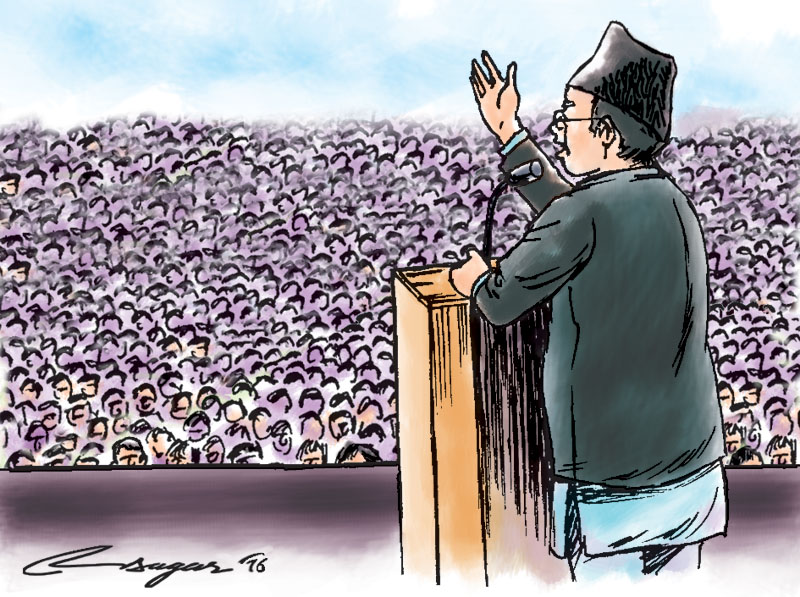Fear of economic downturn: Whom to blame?
Declining value of Nepalese currency, high trade deficit following uncontrolled imports, inflation backed up by black-marketing have pointed towards grave days ahead for Nepal
Acute energy shortage has further affected Nepal by outrageous power outages. Enough is enough but who’s to blame? This is a billion-dollar question. Had Pancheshwor Multipurpose Project been completed within seven years from its initiation in 1996, we would not have power shortages. How better our life would have been then.
Following disruptions from all sides, the economy is bleak. For many, there is a ‘black economy’ being held hostage by black-marketeers. Government officials fear illegal or an unorganized economy. Researchers and bankers would prefer to say Nepal is presently having a shadow economy. Government also lost huge revenue during the earthquake and blockade period. It has further slowed down economic activities, which have adverse effects on the financial sector and real estate. Retail market has hard hit by the black-marketeers, following an ineffective monitoring mechanism. Consequently, youth and industry workers have knowingly escaped this crisis, seen in the booming of their departures overseas for safe employment.
Experts blame that poor governance and red-tapism is solely responsible for the failure of Nepal’s power projects. This seems to suffice, but is not satisfactory. But what about political instability? What about the lack of iron determination of the leaders for uninterrupted growth of infrastructure? What about the common minimum agenda? Many such inquiries are unanswered.
People are concerned. They should be the top priority. Poverty eradication, employment for all, rapid economic growth, income equality are the goody-goody words that are often heard in a political leader’s speech. There is no harm in writing nice words, but bringing them into action is difficult. That’s why the implementation part of public policies and governance has always been in debate and public discourse.
Political consent on the efforts of local actors is rarely met in Nepalese history. Mediation is, however, essential for many turning points. Relatively, all economic activities and productions are subject to co-ordination and linkages with its neighbours, mainly from India. Being its major trade partner, Nepal’s intrinsic value of economic growth is truly dependent on the success of the Indian economy.
If the current dilemma in the national consensus for demarcation of provinces and rights of the minorities continues to rise, Nepal will be economically at risk. Risk in the sense that its political equilibrium will remain more fragile not ruling out further political instabilities and violence with the minorities. Therefore, in order to save the economy, ethnic tensions and concerns need to be addressed. This is, however, a political problem, but the outcome is affecting the economy. It’s high time for the rulers and responsible leaders to rethink the situation of the country, and act accordingly. The people seem extra cautious these days. Perennial disruptions on essential supplies have severely affected active lifestyle. Increasing power cuts in the winter have been part and parcel of every Nepali citizen. While supply of fuel with electricity grips Nepal, solar industry eyes stimulated growth. People can take voluminous sigh of relief from solar products, enjoying government’s grant on it. Rooted problems are not in the action, but lie in the cultural and customs beliefs of the Nepalese also. People have more confidence in their fate, faiths, customs and beliefs than their hard work.
Continuing tensions are further intensified by unexpected natural hazards also. First, there were powerful earthquakes that took thousands of lives and destroyed property, then the economic blockade began, causing an acute fuel crisis. Lack of fuel later posed a burden on electricity, which is bound to be cut anyhow every winter. This brought a serious humanitarian crisis. Struggles to procure basic commodities have become the daily routine of Nepali people. Poor infrastructure, disrupted supplies, rampant corruption and anomalies in the public sector see Nepalese wish to rise again, after the massive earthquakes. Declining value of Nepalese currency, high trade deficit following uncontrolled imports, inflation backed up by black-marketing have pointed towards grave days ahead for Nepal. Food and energy security have drawn serious concern along with unity, self-reliance, domestic production and trade diversification. Certainly, there needs to be a great discourse on these priority issues, but drafting a quick action plan by the concerned authorities is more important. Following disruptions from all responsible sectors, the current crisis has led to emergence of a shadow economy.
There is, therefore, the need to urgently prioritize and work towards food and energy security, first. And those priorities should get realigned with the importance of continued progress on big projects. Increased trade diversification can play a pivotal role in bridging transit channels between China and India, the world’s fastest growing economies. The financial sector, on the other side, should be stimulated by mobilizing the liquidity surplus into the productive sector, mainly of energy and agriculture, which are the mainstay of the economy. This will boost the production drastically and will ease trade diversification. In doing so, the crisis would not be as much as it is today. Significant efforts by way of fast track are essential for this, which needs to be optimized and implemented.
Giri is Assistant Director at Nepal Rastra Bank.






